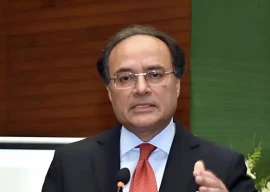
Sources told The Express Tribune that Petroleum Minister Asim Hussain is expected to chair a meeting on Monday (today) to finalise plans to increase the supply of gas to the fertiliser manufacturing sector, with the aim of eliminating outages completely. The CEOs of major manufacturers are also expected to attend the meeting.
During the three months of winter, when gas consumption by domestic users is at its highest, the government plans on suspending supply of gas to industries that have nine-month contracts with state-owned gas companies and divert 500 million cubic feet per day (mmcfd) to the fertiliser manufacturers, who rely on gas as their raw material.
In addition, the government may suspend gas supplies to compressed natural gas (CNG) stations four days a week in a move that sources said may save about 75 mmcfd.
Fertiliser manufacturers currently receive 74% less gas than they need, a decision that causes them to curtail production, which in turn creates a shortage of 1.7 million tons of urea per year in the country that has to be filled through imports. Locally-made fertiliser is less than half the price of imported fertiliser.
“The lower production of urea is costing fertiliser manufacturers Rs40 billion in revenues and the government is losing Rs10 billion in taxes that the sector would have paid on its profits,” said a source familiar with the situation.
The government also subsidises imported fertiliser for farmers, which costs an additional Rs47 billion, taking the government’s net loss to Rs57 billion, with another $927 million are lost in foreign exchange.
According to a presentation to be made at the meeting on Monday, prices of urea have been rising sharply with one 50-kilogramme bag that used to cost Rs700 now costing Rs1,700.
Under the current gas load management plan, four fertiliser manufacturers – Engro, Pak-Arab, Pak-American and Dawood Hercules – are divided into two clusters and being provided with gas 15 days a month on a rotational basis by the state-owned Sui Northern Gas Pipelines.
The fertiliser sector has been lobbying hard for more gas to be supplied to their manufacturing units, arguing that economic benefits provided by their product far outweigh whatever benefits any other sector might be able to provide, if they were supplied that gas. The government now appears to agree with that position.
“We want to operate these fertiliser plants at 80% of their production capacity by supplying them with more gas,” the petroleum minister told The Express Tribune.
It is unclear, however, whether the government will be able to overcome political opposition to the bill. Several members of the National Assembly committee on petroleum and natural resources, for instance, have opposed the government’s decision to supply gas to Engro’s new fertiliser plant under its contractual obligations. They say that doing so causes outages for consumers in Punjab.
Yet, the government may find some unlikely allies as well. The Sindh Abadgar Board (SAB), the lobby for large agricultural land owners in Sindh, said that they opposed the government’s decision to increase gas prices for fertiliser manufacturers, fearing a rise in the price of urea.
“The agriculture sector will pay another Rs96 billion [in higher urea prices] if the government raises the price of gas for the fertiliser sector,” said Abdul Majeed Nizamani, president of the SAB, at a press conference in Hyderabad on Sunday.
Yet as irked as the landowners were about higher domestic urea prices, they seem even more perturbed at having to pay the prices for imported urea, with Umer Farooq Khan, vice president of the SAB, denouncing the government’s policies that discourage local production of urea. (With additional reporting by Z Ali in Hyderabad)
Published in The Express Tribune, August 1st, 2011.







1724319076-0/Untitled-design-(5)1724319076-0-270x192.webp)
1726732405-0/Express-Tribune-Web-(15)1726732405-0-270x192.webp)


1735025557-0/Untitled-(96)1735025557-0-270x192.webp)











COMMENTS
Comments are moderated and generally will be posted if they are on-topic and not abusive.
For more information, please see our Comments FAQ